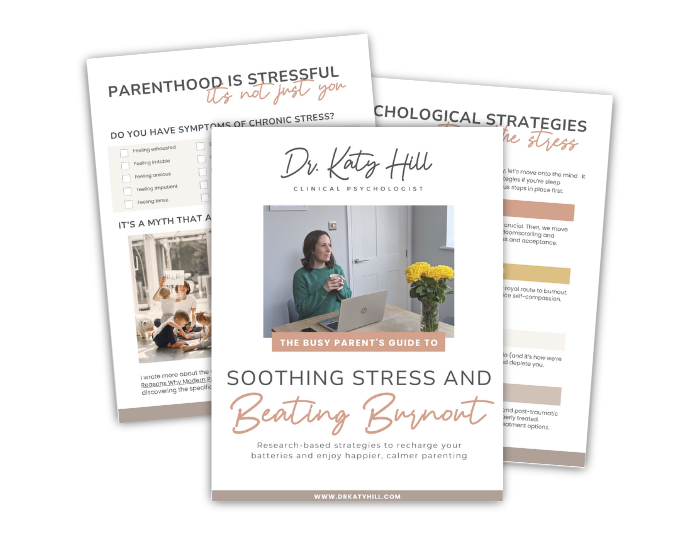It’s meant to be a joyful day of celebration but Mother’s Day can be hard for us mothers for lots of reasons – perhaps you’ve lost your own mother or have a difficult relationship with her or maybe you’re struggling with infertility or child loss.
There’s lots of advice online about managing with these struggles but not so much about how to cope with a day that celebrates mothering when you’re stressed out by or even fed up of being a mother.
I’m talking about coping with difficult feelings on Mother’s Day when you’re in parental burnout. Parental burnout is a chronic stress condition where you feel so completely exhausted and fed up of parenting that it has lost all its joy. So, unsurprisingly, a day that celebrates motherhood when you’re not enjoying it can be really difficult.
If you’re not aware of what parental burnout is then read my blog here first. And if you’re already feeling stressed out, on your way to burnout or already there – then this blog is for you.
WHY IS MOTHER'S DAy HARD FOR bURNED OuT MOTHERS?
There are lots of reasons, let’s name a few:
1. Burned out mothers are already feeling bad about their parenting so this day can really amplify those feelings. It can feel like everyone else is excelling at motherhood but you’re falling short. Maybe you tell yourself that you’re such a ‘terrible mother’ that you don’t deserve any compliments or gifts?
2. Social media often presents a very airbrushed view of motherhood at the best of times but it can really go into saccharine overdrive on Mother’s Day. It can feel like every other mother is loved and appreciated more than you or that they’re all enjoying Mother’s Day more than you. Logically we know that this is just the highlights reel of someone’s day and that a lot of social media is fake but emotionally it can still feel like a punch to the guts.
3. A day of self-celebration can feel really uncomfortable if your burnout is partially fuelled by self-sacrifice and neglecting your own needs in the service of others. You might not feel comfortable being in the spotlight and have trouble accepting compliments. Alternatively, you may feel that you just have to much to do to have a day off from the ‘work’ of parenting.
4. Other mothers reach burnout in a context of lack of support and Mother’s Day can be a painful reminder of feeling neglected and unappreciated by your family. You might feel frustrated by some glib card proclaiming you to be ‘Supermum’ when what you actually want is to not have to do it all alone.
5. Many burned out mothers actually want a break from being a parent; not a full day with their kids. So societal expectations to enjoy a family day together can leave you feeling very guilty or ashamed by your understandable desire to be alone.
1. Acknowledge your feelings
The first step to dealing with any difficult feelings is to acknowledge them – actually stop and notice how you’re feeling. What feelings does ‘Mother’s Day’ bring up for you? Sadness that it’s not the day you hoped? Anger that you’re not being celebrated like it seems everyone else is? Guilt for wanting to be celebrated and so ‘being selfish’ or ‘not grateful’ enough?
Whatever you’re feeling is valid and makes sense. Doesn’t it make sense given everything you know about yourself, your motherhood journey, your past and current life experiences that you’d feel these feelings on this day?

The Parental Burnout Quiz
Curious what your own parental burnout score is? Download the free assessment and get your score – plus expert tips on how to reduce it.
2. GIve yourself lots of self-compassion
Once you’ve acknowledged and validated what you’re feeling; let’s acknowledge something else. How hard this is. How hard it is to not feel happy and joyful and grateful on a day where it seems all mothers are being lavishly celebrated (because that’s what marketeers and influencers tell us).
It’s tempting to deny our feelings, maybe try to push them away with distractions or berate ourselves for having them. But you know that really doesn’t help.
Instead, can you turn towards these difficult feelings with kindness and tell yourself “This day is hard for me. I’m feeling (this emotion or emotions) and that makes sense given (my personality, life history, current circumstances). I’m not alone in this; it’s hard for lots of mothers. Let me be understanding and gentle with myself today”.
3. ask for what you want
Some of the heartache on Mother’s Day comes from having unfulfilled expectations and hopes. Maybe we want a meal cooked for us, a family day out that we didn’t have to organise ourselves, or maybe we want time alone. But if we don’t communicate that to anyone, how could they know?
It’s not really fair to expect our families to just know exactly what our vision for the day is; they’re not mind-readers. Sometimes, we feel that if people really loved us then they would know exactly how to care for us, but that’s not realistic.
It’s not romantic but it’s better to feel slightly awkward saying in advance, “This year, I’d love it if you made us dinner/we had lunch out/you watched the kids while I do my own thing” then seething all day with resentment at the lack of plans or unwanted gift.
4. STATE WHAT YOU DON'T WANT
If you have trouble with assertiveness around what you do want then you might also have difficulties around setting boundaries on what you don’t want. Many burned out mothers I work with identify with being a ‘people-pleaser’. Many of us were socialised to be ‘good girls’ and put others’ needs before our own.
You might find that Mother’s Day feels difficult because you’re spending the day doing things you don’t want to do – visiting your mother or mother-in-law and making a fuss of them whilst feeling neglected yourself or spending time corralling your children in a busy restaurant when you’d rather be hiking alone in the countryside. Again, it’s ok to politely but assertively state what you want to do on this day.
5. get some support
Mother’s Day can bring up all sorts of complicated emotions, thoughts and memories. It can feel much worse if you’re suffering in silence. Reach out to a trusted friend who gets it or a non-judgemental and supportive online community (The Village Facebook group run by Clinical Psychologist Dr Emma Svanberg is great for this) and get the understanding and solidarity you deserve.
Perhaps this is the nudge you needed to recognise that the difficult emotions around Mother’s Day are just one manifestation of parental burnout. That actually, you’re struggling with difficult thoughts and feelings as a parent in general. If so, perhaps call a supportive phoneline for parental emotional wellbeing (like Family Lives here; they also have text and email support options) or speak to your health visitor or GP about what maternal mental health services there are in your area.
summing up
Despite what you might see on social media and in the windows of cards shops and florists, Mother’s Day is actually a complicated emotional day for many of us. In a recent poll in my stories on Instagram, only 6% of mothers said they look forward to the day.
It’s such an overhyped day (driven by consumerism – £1.7bn is estimated to be spent on Mother’s day this year in the UK) but the reality is it is just a day. A day where we might feel moments of joy and gratitude but also perhaps frustration, boredom, disappointment etc. You might get a croissant in bed but the emotional and physical work of parenting will still be waiting for you; the school uniforms and packed lunches will still need to be prepared for Monday morning.
If you’re having an especially hard time this year then please don’t brush those feelings aside. See if you can reflect on what they might mean and whether you can bring some understanding and compassion to them. What is the message that they’re giving you – do you need more childcare support, more recognition, more breaks? Do you have patterns of people-pleasing or difficulties with assertiveness or boundaries that you’d like to explore? Is this the sign that you need to start taking your parental burnout seriously and seek more support?
I offer online therapy for parental stress, burnout, anxiety and anger – drop me a quick email here if you’d like to discuss working together so that you can enjoy a happier motherhood experience.








